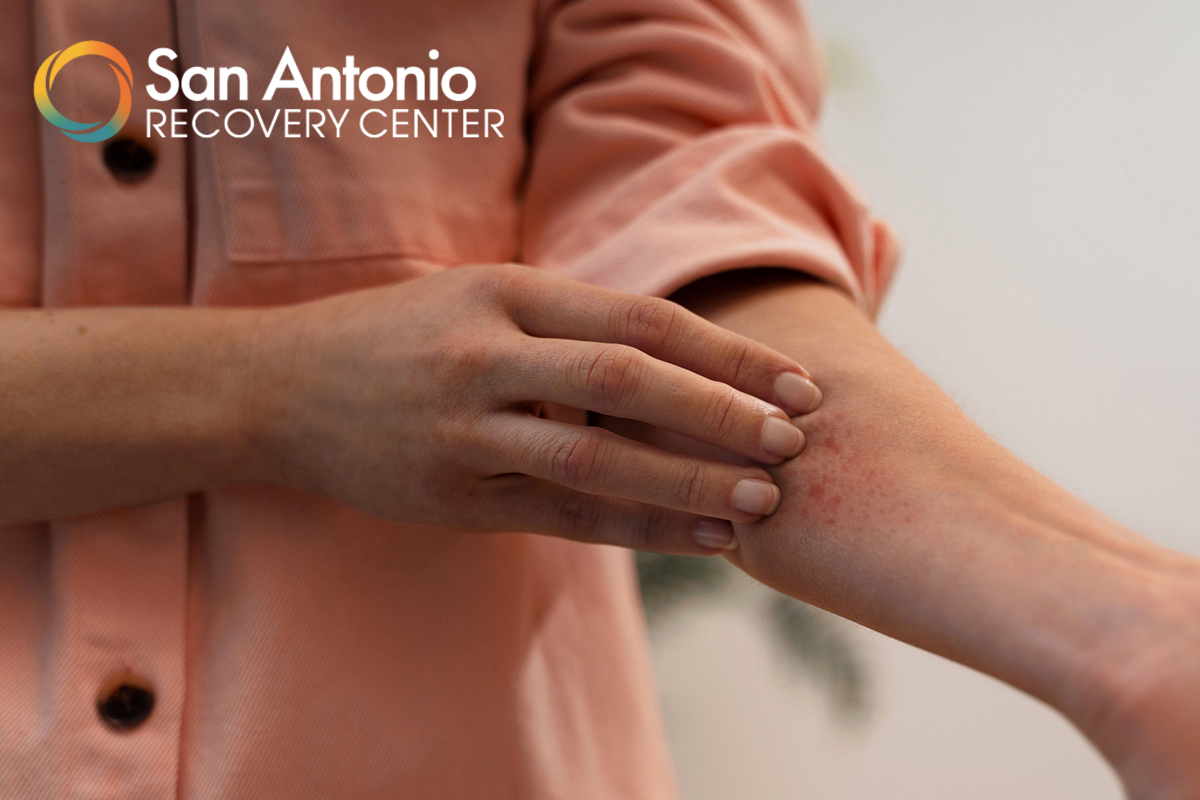
Have you ever had an itch that you can’t scratch? Or what about a really bad itch? Like an itch so intense that you don’t know how to distract yourself? Maybe just reading this is making you feel itchy.
Everybody gets itchy – it’s just an uncomfortable fact of life. But how do you know if it’s a sign of something concerning?
Recently, you may have noticed a loved one has been scratching. If this behavior is new, or it is accompanied by other worrying behaviors, you might be worried about the cause.
In 2022, alone over 3 million people in Texas needed treatment for a substance use disorder (SUD). SUD can have a lot of different symptoms and side effects for people. If you are concerned that someone in your life may be living with SUD, doing research is the right first step.
At San Antonio Recovery Center, we know that taking on recovery can be overwhelming, especially if you don’t know anyone who has experienced it. That’s why we are proud to be able to connect our clients to the largest alumni network in San Antonio.
Whether itching is the first symptom you’ve noticed in a loved one or it’s just the latest in a series of symptoms that concern you, it’s worth looking into. So, let’s get into what drugs cause itching.
If you have a serious itch, one of the first questions you are likely to ask is why. The reason could be a condition known as drug pruritis, or drug-induced itching.
The truth is, there are many different reasons that a substance may cause itching, and it is not always a sign of a SUD. Itching is a common side effect of some prescription medications.
Prescription medications that can cause itching include:
The cause of itching depends on the specific medication that has been prescribed. For example, antibiotics can cause itching due to a build-up of bile in body tissue known as cholestasis. Statins, on the other hand, cause itching because they lower the production of cholesterol in the body.
However, it is not just appropriately used prescription medications that can cause itching. There are cases where itching can be a sign of substance use disorder.
It is very common for both prescription and recreational opioids to cause itching. In fact, as many as 60% of people who consume prescription opioids report itching as a side effect. This is caused by the histamines that are released when the drug is consumed. This process triggers the immune system, which causes itching when blood vessels expand and more blood travels to certain parts of the body. In addition to an itching sensation, it can cause some swelling, similar to a minor allergic reaction.
In addition to swelling, opioid-induced itching can also be caused by the effect opioids have on the central nervous system. Specifically, opioids could be impacting the way that the brain with nerve receptors in the skin produces an itching sensation.
Examples of illegal opioids include fentanyl and heroin. Other opioids, like Vicodin and Oxycodone, can be legally obtained if prescribed by a doctor, but produce many of the same side effects as their illegal counterparts when they are abused.
While meth does not necessarily create an itching sensation in the same way that opioids might, the act of scratching at the skin is common among people participating in meth use. Many people who have consumed meth experience a hallucination called “meth mites.” This is a sensory hallucination where people who have consumed meth long-term often see bugs or feel them under their skin. This commonly causes people to scratch at the skin in a futile attempt to remove the perceived bugs.
Unfortunately, “meth mites” can result in serious wounds and even scars, because scratching ultimately does nothing to ease the hallucination.

The length of time itching lasts as a side effect depends on multiple factors. These can include the amount of a substance consumed, the half-life of that particular substance, and the metabolism of the person participating in use. Typically, if itching occurs as a side effect of a substance, the itching will subside once the substance has worked its way through the body.
However, itching can also be a symptom of health issues that occur as a result of regular, long-term participation in substance use. This can include serious health issues like liver failure or kidney disease. It can also be a sign of less severe issues like dry skin due to poor personal hygiene.
Itching that cannot be controlled or that lasts an unreasonably long time is not normal and you should seek medical help.
Itching can occur virtually anywhere on the body. This is especially true if someone is reacting to a substance they have ingested. However, itching can also occur as a result of the way a substance is administered to the body. For example, injection sites can easily become infected and feel itchy as a result. Additionally, itching can occur as skin heals or in places where hair is regrowing.
Someone who is having an allergic reaction may experience itching in the specific location where they have come into contact with an allergen. This may result in visible redness, hives, or a rash on the affected area.
Some level of itchiness is normal and can be expected. However, experiencing itchiness that is constant or does not have an obvious source is a cause for concern. Any itching sensations that are so intense or constant that scratching at them causes a person to break the skin or draw blood should be examined by a medical professional.
If you have a severe itch that does not have an apparent cause, you could be experiencing a serious medical condition. This could include an allergy, liver or kidney failure or an autoimmune disorder. You do not need to suffer through discomfort. If you have an itch that will not go away, you should seek medical attention.
Itching can be a sign of SUD, however itching occurs for a variety of different reasons. So, if you are concerned about a loved one, how do you know if itching is a sign of SUD?
Itching on its own is not enough to determine whether or not someone is living with SUD. However, if a new or intense itching has occurred alongside other physical symptoms and changes in behavior, there may be cause for concern.
Someone experiencing SUD is likely to experience side effects other than itching. This might include changes in sleep patterns, energy levels, or appetite.
Sudden changes in behavior could also be an indicator of SUD. Some behavioral changes could include withdrawing from their existing social circles, going out at odd times or staying out late, and giving up hobbies and activities they used to enjoy.

If you’ve noticed that itching and other side effects or consuming substances are becoming more severe, it may be time to look into drug and alcohol rehab. While taking the first step towards recovery may feel overwhelming, a life free of substances is possible.
Everyone’s needs are different, but a good program should support you through a detox regime that helps you while you get substances out of your system. Once you’ve gone through detox, a likely next step is in-patient treatment with a considerable amount of talk therapy to get to the root of underlying factors contributing to your SUD. After you graduate from in-patient treatment, it is important to have continued support in the early days of your recovery, including continued mental health treatment.
Here at San Antonio Recovery Center, we know how important competent care is to a successful recovery, and we are prepared to take on extremely complex dual-diagnosis conditions.
At San Antonio Recovery Center, we understand that the journey of recovery is different for everyone, and we are committed to walking the path with you every step of the way. Whether you’re looking for help for yourself or a loved one, contact us today by phone at 866-957-7885, or through our website.
Strength. Acceptance. Recovery. Community.
contact us now!
